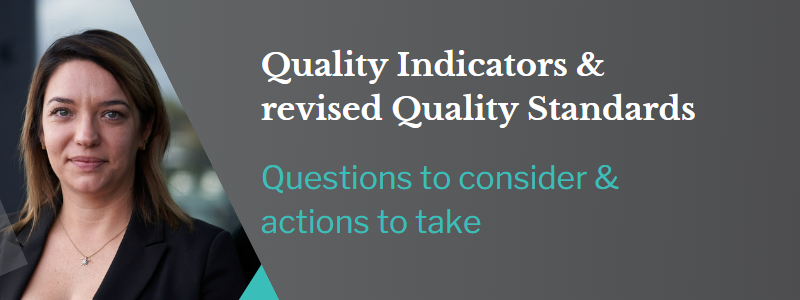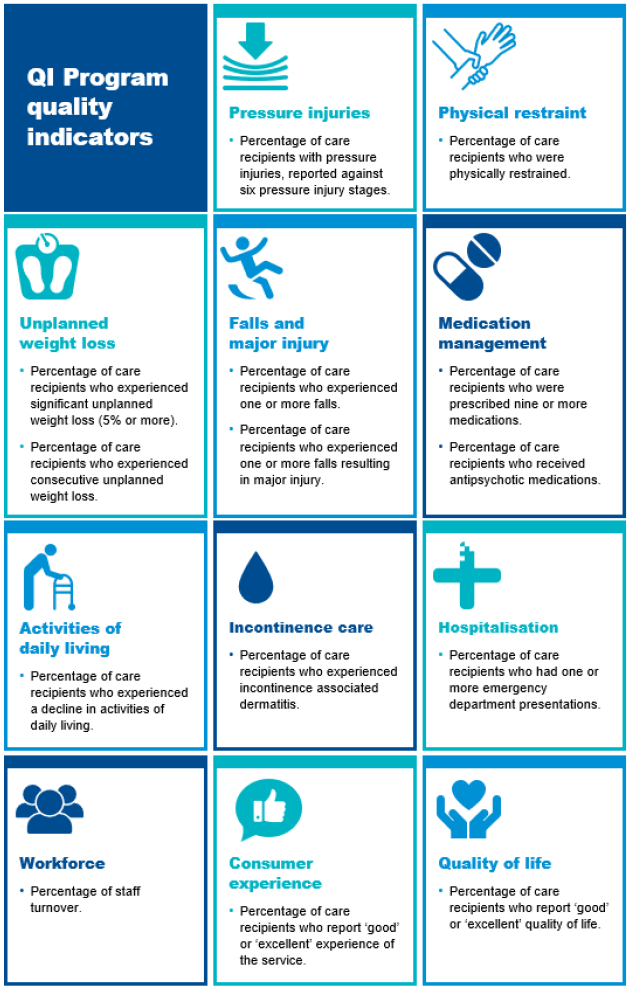How to prepare for additional Quality Indicators and revised Quality Standards
March 9, 2023 | Quality

By Katie Airey, Quality, Risk and Compliance Lead & Taranjot Minhas, Consultant
From 1st April 2023, aged care providers will be required to start collecting data on an additional six Quality Indicators (QI) which include activities of daily living, incontinence care, hospitalisation, workforce, consumer experience, and quality of life.
This data will need to be submitted via the provider portal by 21st day of the month, after the end of each quarter (so by 21st July 2023 for the period of 1st April to 30th June).

The Department of Health and Aged Care (DoHAC) website has lots of resources on each QI, including quick reference guides and details on assessments to be used.
Given the QI program forms 15% of the Star Ratings System for residential aged care providers, these quality indicators have a significant impact and give greater visibility of a facility’s care outcomes to the public.
While there is some overlap, there are significant differences between the Consumer Experience and Quality of Life, Quality Indicators versus the Resident Experience Surveys conducted for Star Ratings. One of our earlier articles covers the differences between the three surveys.
The Revised Aged Care Quality Standards are being designed to ensure:
- Easier understanding
- Greater relevance to aged care services
- Higher measurability and
- Easier implementation
Public consultation took place from Oct-Nov 2022 through online focus groups, an introductory webinar and a survey as well as opportunity for written feedback.
You can learn about each standard in detail in our Quality Standards in Focus series:
Standard 1: The Person
Standard 2: The Organisation
Standard 3: The Care & Services
Standard 4: The Environment
Standard 5: Clinical Care
Standard 6: Food & Nutrition
Standard 7: Residential Community
As providers gradually come toward managing their funding and workforce requirements, the below questions and actions may be helpful for governing bodies, executives and senior management to prepare for the imminent QI additions and revised Quality Standards in the future.
In addition to the increase in QI reporting requirements and the upcoming changes to the Quality Standards, the DoHAC are also in the pilot stage of developing and implementing monthly care statements.
Monthly care statements will include information about each consumer’s care, including:
- Changes to care plans or their care needs
- Any incidents, injuries, falls, hospital/GP visits
- Medication given, changes to prescribed medication regimes along with general updates
- Appointments and
- Feedback.
It is expected that the pilot will run between February – June 2023, with evaluation of the program taking place between June – August 2023.
The DoHAC will advise when compulsory care statements will come into effect once development of legislation has been completed.
Questions to reflect on:
- What data and assurance are you getting about clinical and quality indicators? Do you receive meaningful data and trends on quality and safety, or does the data lack an insightful narrative?
- What quality management systems are in place to support quality outcomes for your residents?
- How is feedback about the quality of care brought to your attention from residents, their families and staff?
- Are you satisfied that an effective culture of safety and quality exists within your organisation?
- Does your documented quality improvement plan need updates?
- Have you updated your policies and procedures for quality management and reporting processes, especially given the additional QIs?
- When and how will you introduce the additional clinical assessments into your clinical framework to support QI requirements?
- Have you incorporated workforce training and competency for the additional QI assessments and surveys?
Actions to take:
- Monitor and evaluate care provision as well as achievement of the organisation’s strategic objectives through regular and rigorous reviews of quality and safety data.
- Ask curious, probing questions on whether systems and processes are working and giving the best outcomes and experiences for your residents.
- Determine how you can use available data to demonstrate compliance regarding the ongoing quality of care and services, explore new opportunities and develop innovative solutions to complex problems.
- Test your systems, processes and policies to ensure they are fit for purpose and will support your organisation now and into the future.
Our quality, risk and compliance team can help you embed efficient processes to enable optimal efficiency in producing reporting data.
Support is always available by partnering with independent experts to undertake data analysis, along with key risk audits and robust systems audits.
The addition of wider industry views to your own organisational experience should be seen as an essential component in the development of well-integrated governance systems.


